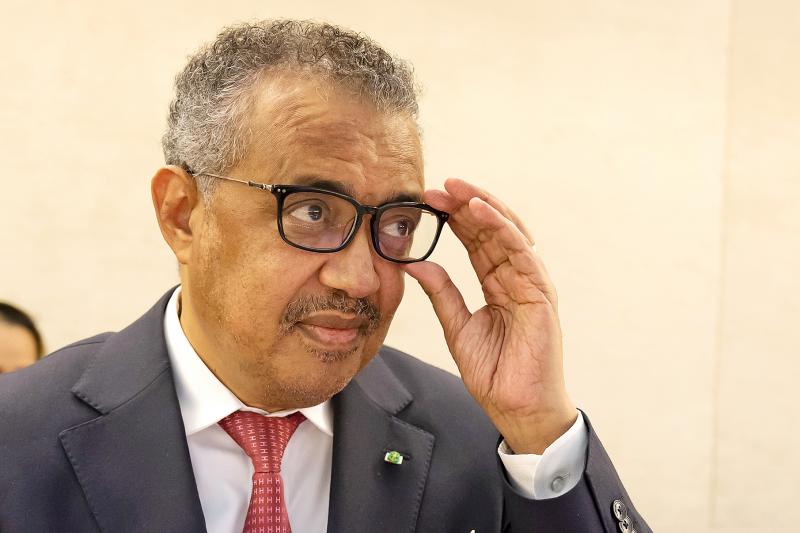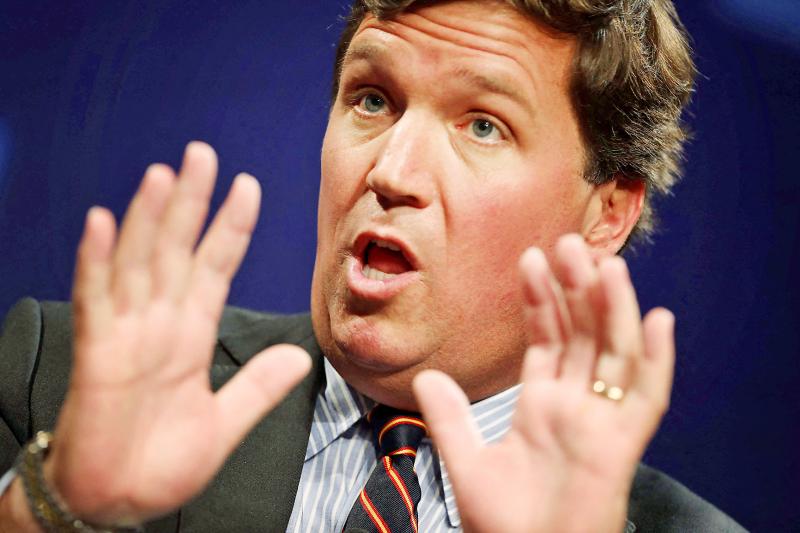The WHO is battling critics of its COVID-19 response who say it is scheming to take over health policy in sovereign nations as it pushes plans it says would help avert future pandemics.
High-profile attempts in countries around the world to discredit the WHO’s efforts are casting a shadow over talks in Geneva, Switzerland, this week.
Country representatives at the talks are discussing how to pave the way for a global agreement that could eventually regulate how nations prepare for and respond to future pandemic threats.

Photo: EPA-EFE
“We may face more severe pandemics in the future and we need to be a hell of a lot better prepared than we are now,” WHO Health Emergencies Program executive director Michael Ryan told reporters recently. “That’s going to require countries to work together.”
It is still far from clear what any future agreement would contain and whether countries would decide that they want it to be a treaty or some other “legal instrument.”
The negotiations — involving member states, not the WHO — are set to last at least two years.

Photo: AFP
However, critics have said that the UN health body is out for a power grab.
Fox News anchor Tucker Carlson, in a segment last month on the pandemic treaty, said that US President Joe Biden’s administration was close to “handing the World Health Organization power over every aspect, the intimate aspects of your life.”
Christine Anderson, a German member of the European Parliament, has warned that the agreement would grant “the WHO de facto governing power over member states.”
British comedian and YouTuber Russell Brand — who challenged the WHO over its attitude toward Taiwan — told his audience that the future treaty meant “your democracy is ... finished.”
“The solution to our ... [pandemic] problems is not to grant more power to an organization that is primarily funded by the United States of America, then Bill Gates’ foundation then the United Kingdom,” he said in a video released on May 21. “I think that they might be subject to biases that are at odds with ... our health requirements.”
The WHO and experts say that such theories, which have also been mentioned in Germany, Australia, Russia and other countries, have nothing to do with what is being discussed.
“I am frankly baffled by the degree of disinformation,” Suerie Moon, codirector of the Global Health Centre at the Geneva Graduate Institute, told reporters, adding that the agreement “is really in the embryonic stage.”
Many of the claims are “completely disconnected from the reality of what is being proposed and potentially negotiated,” Moon said.
WHO Director-General Tedros Adhanom Ghebreyesus also recently said that “unfortunately, there has been a small minority of groups making misleading statements and purposefully distorting facts.”
The “WHO’s agenda is public, open and transparent,” Tedros said.
The pandemic agreement is solely about establishing “the playbook for how we’re going to prepare together” for future pandemic threats, Ryan said.
“That’s not about sovereignty; that’s about responsibility,” he said.
However, proponents of the plans are struggling to make such arguments heard.
The WHO coined the term “infodemic,” saying that there was a deluge of disinformation surrounding its efforts to rein in the COVID-19 pandemic, especially regarding vaccines.
And now observers suggest that the WHO and the planned agreement it is pushing for have become targets of a disinformation campaign across multiple countries, although the exact goal and who is behind it remain unclear.
Just the name WHO “is like a trigger,” Tristan Mendes France, a French conspiracy theory expert, told reporters, adding that it was easy to “reactivate” the “huge conspiracy theory audience that has been growing during COVID.”
Sebastian Dieguez, a neuroscientist and disinformation expert at Switzerland’s University of Fribourg, pointed to how social media groups dedicated to one form of extremist thought or conspiracy theory often switch names and topics, bringing hundreds of thousands of followers along.
“When you have a solid network on something, it can be used for other things,” he said.
“Even though some of it is absurd, you still have to deal with it, you still have to explain, and this cuts out resources,” Dieguez said.
Moon said that there “are limits to what WHO can do,” pointing to rampant misinformation — when faulty information is shared due to honest misunderstandings — and mistrust in authorities across the board in “this post-truth era, where people live in different information universes.”
“Can WHO change that? Can anybody?” she asked.
Additional reporting by staff writer

POLITICAL PRISONERS VS DEPORTEES: Venezuela’s prosecutor’s office slammed the call by El Salvador’s leader, accusing him of crimes against humanity Salvadoran President Nayib Bukele on Sunday proposed carrying out a prisoner swap with Venezuela, suggesting he would exchange Venezuelan deportees from the US his government has kept imprisoned for what he called “political prisoners” in Venezuela. In a post on X, directed at Venezuelan President Nicolas Maduro, Bukele listed off a number of family members of high-level opposition figures in Venezuela, journalists and activists detained during the South American government’s electoral crackdown last year. “The only reason they are imprisoned is for having opposed you and your electoral fraud,” he wrote to Maduro. “However, I want to propose a humanitarian agreement that

ECONOMIC WORRIES: The ruling PAP faces voters amid concerns that the city-state faces the possibility of a recession and job losses amid Washington’s tariffs Singapore yesterday finalized contestants for its general election on Saturday next week, with the ruling People’s Action Party (PAP) fielding 32 new candidates in the biggest refresh of the party that has ruled the city-state since independence in 1965. The move follows a pledge by Singaporean Prime Minister Lawrence Wong (黃循財), who took office last year and assumed the PAP leadership, to “bring in new blood, new ideas and new energy” to steer the country of 6 million people. His latest shake-up beats that of predecessors Lee Hsien Loong (李顯龍) and Goh Chok Tong (吳作棟), who replaced 24 and 11 politicians respectively

Young women standing idly around a park in Tokyo’s west suggest that a giant statue of Godzilla is not the only attraction for a record number of foreign tourists. Their faces lit by the cold glow of their phones, the women lining Okubo Park are evidence that sex tourism has developed as a dark flipside to the bustling Kabukicho nightlife district. Increasing numbers of foreign men are flocking to the area after seeing videos on social media. One of the women said that the area near Kabukicho, where Godzilla rumbles and belches smoke atop a cinema, has become a “real

‘WATER WARFARE’: A Pakistani official called India’s suspension of a 65-year-old treaty on the sharing of waters from the Indus River ‘a cowardly, illegal move’ Pakistan yesterday canceled visas for Indian nationals, closed its airspace for all Indian-owned or operated airlines, and suspended all trade with India, including to and from any third country. The retaliatory measures follow India’s decision to suspend visas for Pakistani nationals in the aftermath of a deadly attack by shooters in Kashmir that killed 26 people, mostly tourists. The rare attack on civilians shocked and outraged India and prompted calls for action against their country’s archenemy, Pakistan. New Delhi did not publicly produce evidence connecting the attack to its neighbor, but said it had “cross-border” links to Pakistan. Pakistan denied any connection to